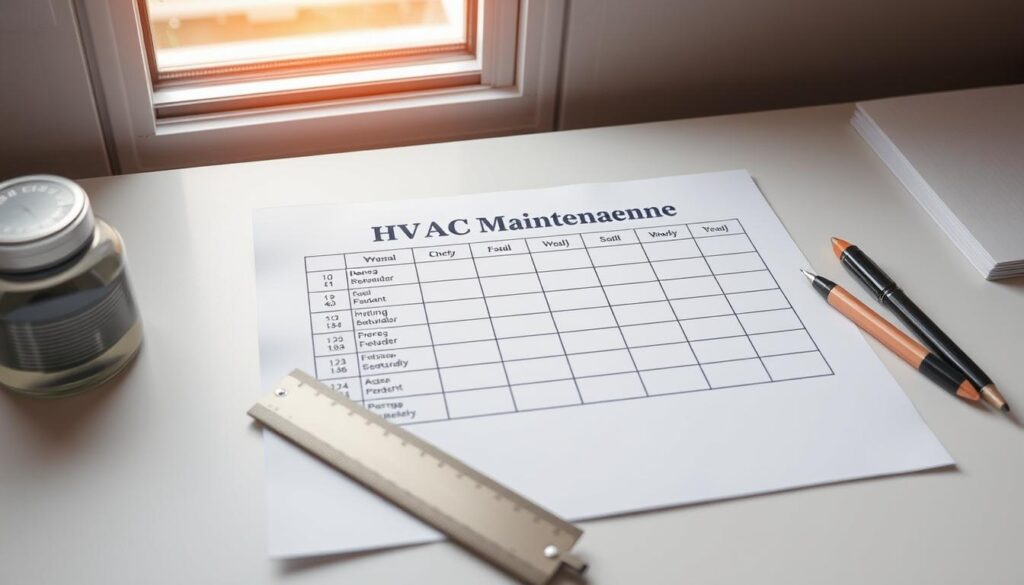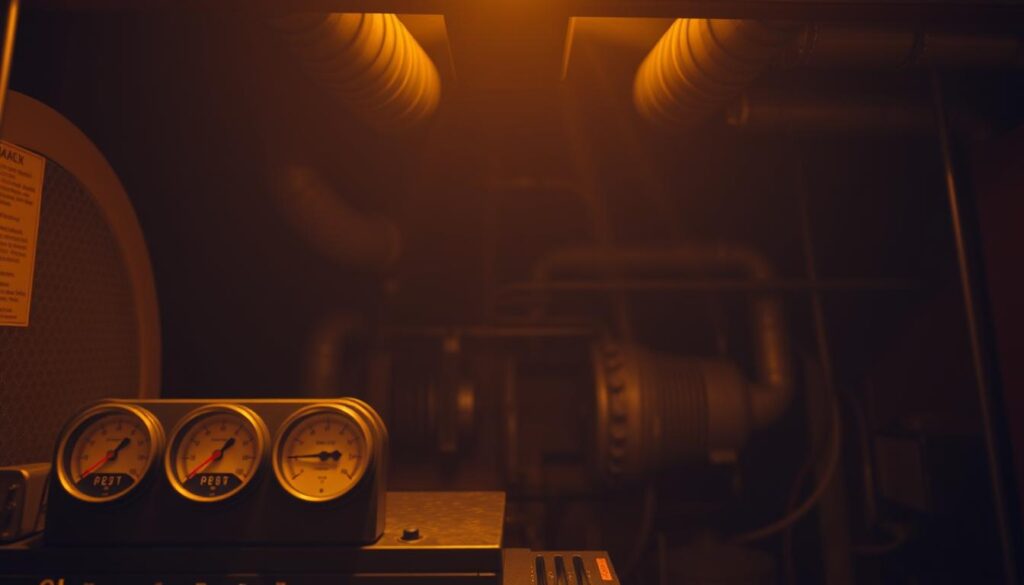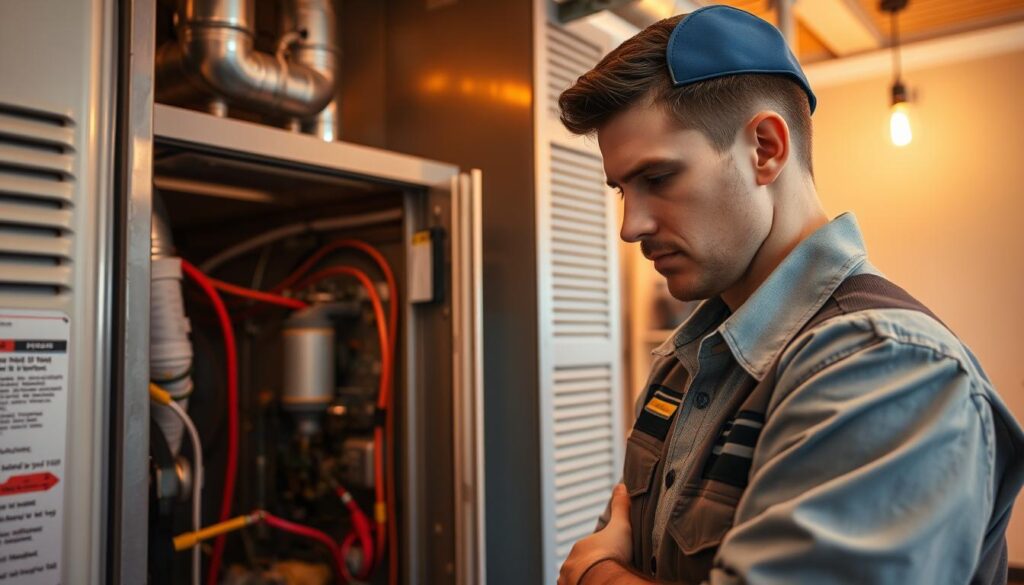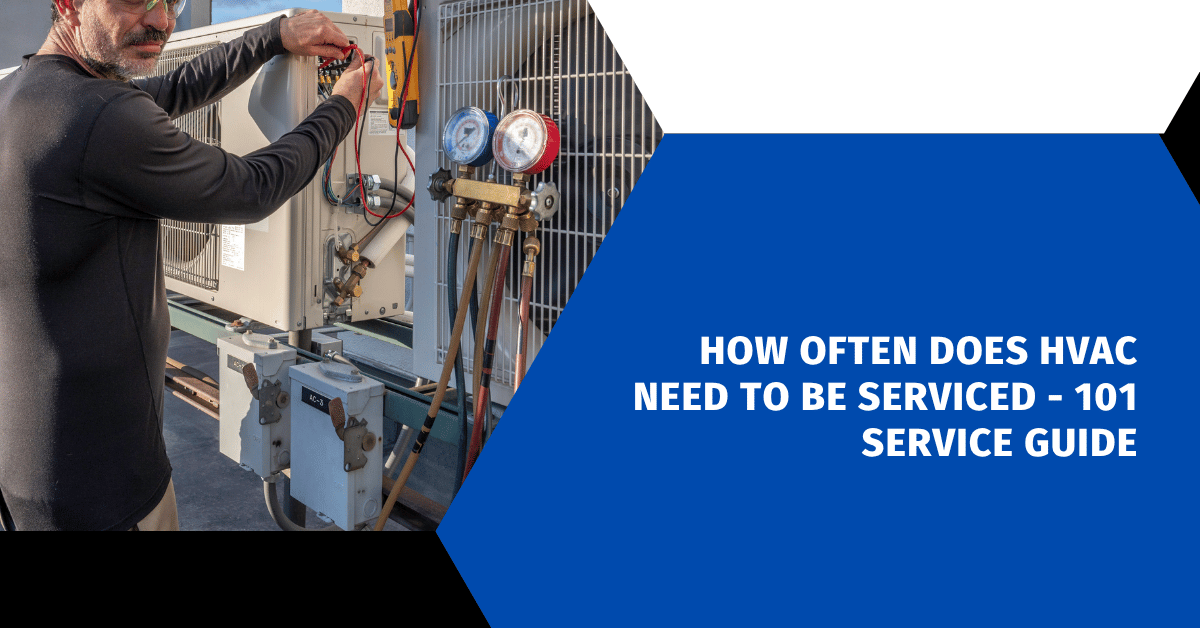Affiliate Disclosure
HVAC Guide Guys is a participant in the Amazon Services LLC Associates Program, an affiliate advertising program designed to provide a means for sites to earn advertising fees by advertising and linking to Amazon.
How Often Does HVAC Need to Be Serviced? Ever thought about if your HVAC system gets enough care? It’s key to keeping your home comfy and saving energy. Knowing when to service your HVAC can greatly improve its performance and life span.

Your HVAC maintenance schedule is more than just a quick check. It’s a big investment in your home’s comfort and your wallet. Experts say you need a detailed care plan, not just occasional checks.
This guide will show you how to keep your HVAC system in top shape. You’ll learn the best service frequency and how to ensure your home’s heating and cooling works well.
Key Takeaways
- Annual HVAC servicing is the minimum recommended maintenance
- Twice-yearly maintenance can significantly improve system efficiency
- Regular service helps prevent unexpected breakdowns
- Professional inspections can identify problems early
- Proper maintenance can extend your HVAC system’s lifespan
Table of Contents
Understanding HVAC Service Frequency and Importance
Your home’s comfort depends a lot on your HVAC system’s health. Regular maintenance is not just a suggestion—it’s key for your system’s best performance and life.
How often you service your HVAC is very important. Experts say you should get it checked at least twice a year. This keeps your system working well.
The Role of Regular HVAC Maintenance
HVAC preventive maintenance includes important steps:
- Comprehensive system inspections
- Cleaning critical components
- Identifying problems early
- Keeping energy use high
Impact on System Performance and Longevity
A well-kept HVAC system lasts longer. Regular checks stop sudden failures and keep it running at its best.
| Maintenance Frequency | System Lifespan | Potential Savings |
|---|---|---|
| No Maintenance | 10-15 years | Minimal |
| Biannual Professional Service | 20-25 years | Up to 40% on repair costs |
Cost Benefits of Regular Servicing
Regular HVAC maintenance might seem expensive, but it saves money. Early care cuts down energy use and avoids expensive fixes.
Regular maintenance is your HVAC system’s best defense against unexpected failures and inefficiency.
Explore Our HVAC Shop
Looking for top-rated HVAC tools, parts, and accessories? Visit our shop and find the perfect solution for your needs.
Visit the ShopHow Often Does HVAC Need to Be Serviced
Keeping your HVAC system in good shape is key for its long-term performance. Experts say you should follow certain hvac inspection intervals. This helps your system work well and avoids sudden failures.
It’s best to have your HVAC checked by professionals twice a year. The best times are:
- Spring maintenance for cooling systems
- Fall maintenance for heating systems
How often you need hvac maintenance depends on a few things:
- System age: Older units need more checks
- How often you use it
- Your local weather
- What the maker says
For most homes, getting your HVAC checked once a year is the least you should do. Proactive homeowners might want to get it checked twice a year. This way, they can make sure it’s working its best and find problems early.
Regular maintenance can extend your HVAC system’s lifespan by up to 40% and improve energy efficiency.
Different HVAC systems need different care. Talking to a professional can help you create a service plan that fits your unit and home’s needs.
Seasonal HVAC Maintenance Requirements
Your HVAC system needs special care for each season to work its best. Knowing what maintenance is needed for each time of year helps keep your system running smoothly. This ensures your home stays comfortable all year.
For spring and fall, your HVAC system needs specific care. This is because the weather changes a lot during these times.
Spring Maintenance Essentials
Spring is the time to get your cooling system ready for summer. Important steps include:
- Cleaning outdoor condensing units
- Checking refrigerant levels
- Inspecting electrical connections
- Lubricating moving parts
- Testing thermostat accuracy
Fall Preparation Strategies
Fall is when you prepare your heating system for winter. Key checks include:
- Examining heat exchanger for cracks
- Cleaning burners
- Verifying gas pressure
- Checking carbon monoxide levels
- Assessing blower motor performance
Weather Impact on Service Frequency
The weather in your area affects how often you need HVAC checks. Places with very hot or cold weather might need more visits from professionals.
| Climate Zone | Recommended Annual Inspections |
|---|---|
| Moderate Climate | 2 times per year |
| Extreme Heat/Cold Regions | 3-4 times per year |
| Coastal Areas | 3 times per year |
Regular maintenance stops sudden breakdowns and makes your HVAC last longer.
Explore Our HVAC Shop
Looking for top-rated HVAC tools, parts, and accessories? Visit our shop and find the perfect solution for your needs.
Visit the ShopAir Filter Maintenance and Replacement Schedules
Your HVAC system’s air filter is key to keeping your air clean and your system running well. Knowing when to replace your air filter is important. It helps your system work better and last longer.
Different air filters need to be replaced at different times. This depends on a few important things:
- 1-2 inch filters: Replace every 1-3 months
- 3-6 inch filters: Replace every 6-12 months
- Homes with pets: More frequent replacements recommended
- Allergies or respiratory conditions: Consider monthly replacements
When you plan your HVAC maintenance, think about these important factors:
- Indoor air quality – If your air is very polluted or dusty, change filters more often
- System usage – If your system runs all the time, filters need to be changed more often
- Home environment – Homes with smokers or lots of pets need filters changed more often
Choosing the right filter is about knowing what you need. Look for filters with higher MERV ratings for better air cleaning. This is good if you have family members with allergies or breathing problems.
Pro tip: Set calendar reminders or subscribe to filter delivery services to ensure you never miss a replacement cycle.
Keeping your air filters clean is a simple but effective way to protect your HVAC system and your home’s air quality.
Professional HVAC Service Components
Professional HVAC servicing is key to keeping your home comfortable. Regular checks help avoid sudden breakdowns and keep your system running well.
It’s more than just maintenance. Skilled technicians do thorough checks to protect your investment and keep your system efficient.
Cooling System Inspection Essentials
Technicians check important parts during a cooling system check:
- Refrigerant level verification
- Condenser and evaporator coil cleaning
- Electrical connection tightening
- Condensate drain line inspection
Heating System Complete Evaluation
Heating system inspections look at key parts:
- Heat exchanger integrity check
- Burner performance assessment
- Fuel line and connection safety review
- Ignition system functionality test
Ventilation System Assessment
Good airflow is vital for your HVAC system’s performance. Technicians check:
- Ductwork for leaks and obstructions
- Air filter condition
- Ventilation system cleanliness
- Airflow balance and efficiency
“Proactive maintenance prevents costly repairs and extends your HVAC system’s lifespan.” – HVAC Industry Expert
Regular professional HVAC servicing protects your home’s comfort system. It ensures long-term reliability and energy efficiency.
Explore Our HVAC Shop
Looking for top-rated HVAC tools, parts, and accessories? Visit our shop and find the perfect solution for your needs.
Visit the ShopSigns Your HVAC Needs Immediate Service

Spotting early warning signs can stop expensive HVAC breakdowns and keep your system running well. Your HVAC checkups should watch for signs that need quick professional help.
Here are key signs you need urgent hvac system tune-ups:
- Unusual Noises: Grinding, squealing, or banging sounds mean there might be mechanical issues
- Inconsistent Temperatures: If rooms don’t cool or heat evenly
- Rising Energy Bills: Sudden, unexplained jumps in your monthly energy costs
- Poor Air Quality: More dust, strange smells, or less airflow
- Frequent System Cycling: Constantly turning on and off without keeping the right temperature
If you see these signs, getting a professional to check your system is key. Waiting too long can cause bigger problems and cost more to fix. Experts can find and fix issues fast, stopping bigger failures.
Don’t wait until your HVAC system completely breaks down – early intervention saves money and maintains comfort.
Regular maintenance through hvac unit checkups catches problems early. This keeps your system running smoothly and makes it last longer.
Different HVAC Systems and Their Service Needs
Your HVAC system is a complex machine with unique maintenance needs. Knowing what each type needs helps you make a good maintenance schedule. This keeps your system running well.
Not all HVAC systems are the same. Each one needs a special maintenance plan to work its best and last longer.
Heat Pump Maintenance Essentials
Heat pumps need more care than other systems. You should get them checked by a pro:
- Bi-annual check-ups
- Clean or replace filters every 1-3 months
- Check the outdoor unit for debris and plants
Ductless Mini-Split System Care
Ductless mini-split systems are flexible but need regular care:
- Clean filters monthly
- Check the exterior unit every quarter
- Get a professional service once a year
Traditional HVAC Unit Servicing
Traditional HVAC systems need yearly professional maintenance. They also need checks during the seasons.
| HVAC System Type | Recommended Service Frequency | Key Maintenance Tasks |
|---|---|---|
| Heat Pump | Bi-annually | Refrigerant check, electrical connection inspection |
| Ductless Mini-Split | Annually | Filter cleaning, condensate drain check |
| Traditional HVAC | Annually | Comprehensive system evaluation |
Pro tip: Always check your system’s maker guidelines for specific maintenance tips. They’re made for your unique HVAC model.
Explore Our HVAC Shop
Looking for top-rated HVAC tools, parts, and accessories? Visit our shop and find the perfect solution for your needs.
Visit the ShopDIY Maintenance vs Professional Service

Keeping your HVAC system in good shape is a mix of doing it yourself and getting help from pros. Some tasks are easy for homeowners to do. But others need the skills of HVAC experts.
DIY maintenance is key to a smooth-running system. Here are some tasks you can do yourself:
- Replace air filters every 1-3 months
- Clean outdoor unit and surrounding area
- Check thermostat settings
- Inspect visible ductwork for obvious damage
For more complex tasks, you need a pro. HVAC technicians can:
- Perform detailed system checks
- Lubricate moving parts
- Check electrical connections
- Verify refrigerant levels
- Calibrate system performance
Warning: Trying to fix complex issues without training can void warranties and damage your system.
Professional HVAC servicing keeps your system at top performance. It prevents expensive breakdowns and extends your equipment’s life.
For the best care, mix DIY maintenance with annual pro inspections. Get professional servicing at least twice a year. This keeps your system running perfectly.
Conclusion
Knowing when to service your HVAC is key to a cozy and efficient home. Your maintenance plan should mix professional checks with your own upkeep. This combo boosts your system’s performance and life span.
Regular care does more than save money. It keeps your home’s comfort system in top shape. Experts say to get your HVAC checked twice a year – in spring and fall. This ensures it works well through all seasons.
Creating a solid HVAC maintenance plan is about teamwork. Pros handle the big checks and fixes, while you do the daily tasks. This teamwork stops sudden failures and makes your system last longer.
Preventive care beats fixing things after they break. Make a maintenance schedule, book pro visits, and watch your system closely. Your hard work means better energy use, lower repair bills, and a happier home.

